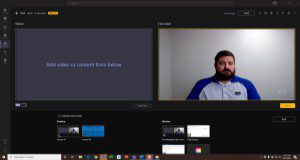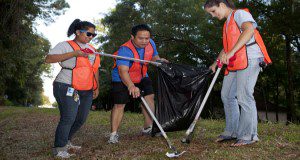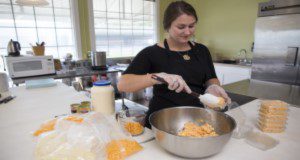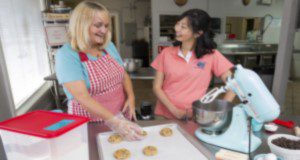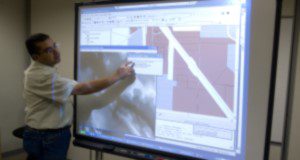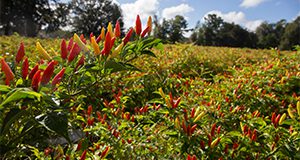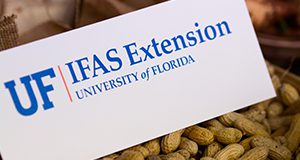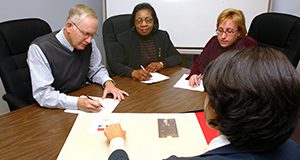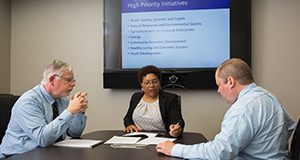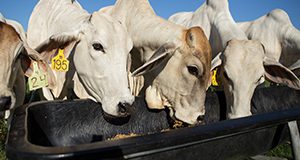Regardless of workspace or class setting, group work has gotten a reputation for being less than pleasant. However, when individuals have the opportunity to prepare for group work via understanding their personal strengths, expectations, and perspectives, the not-so-popular group work can often turn into pleasant, productive, and collaborative engagement. Because group dynamics shift and vary from group to group, there is a constant learning opportunity to understand how to work in groups successfully. This new 2-page publication of the UF/IFAS Department of Agricultural Education and Communication will identify simple yet effective strategies that can serve as foundational building blocks whenever preparing oneself or others for group work. Written by Cecilia E. Suarez and Jarred A. Shellhouse.
https://edis.ifas.ufl.edu/wc389
Category: Workplace
Microsoft Teams for CEU and Training Delivery
The Microsoft Teams collaboration platform is popular among UF/IFAS faculty, researchers, Extension agents, and staff for its ease of use and utility for internal and external communication, collaboration, and meetings. The Teams webinar feature called live events can be used for a more controlled experience for large meetings, events, or CEU delivery. This new 5-page article will discuss the benefits and possible limitations of this service, specifically for offering online CEU material that meets Florida Department of Agriculture and Consumer Services (FDACS) guidelines for such trainings. Written by Brett W. Bultemeier and Joe Gasper and published by the UF/IFAS Pesticide Information Office.
https://edis.ifas.ufl.edu/pi290
Leading Difficult Conversations Series #3: Creating a Safe Conversation Environment
This publication series is intended for leaders who bear the responsibility of having difficult conversations as part of their professional responsibilities. Earlier in this publication series, the foundational principles of preparing for difficult conversations were established: (1) defining the issue and (2) determining your motive for the conversation. Once those principles are put into practice, the next phase of having a difficult conversation is creating a safe environment for the conversation. Components of creating a safe environment include recognizing a conversation’s content and conditions, understanding the threats to a safe environment, and utilizing skills to overcome threats to restore safety. This new 3-page publication of the UF/IFAS Department of Agricultural Education and Communication was written by Christy Chiarelli.
https://edis.ifas.ufl.edu/wc384
Fundamentals of Volunteer Orientation
This new 4-page fact sheet is intended to assist volunteer managers when creating volunteer orientations for their new volunteers. Volunteer training and orientation is a critical component which should promote volunteers’ understanding of the role they hold within organizations. Leaders of volunteer organizations must ensure their organizations have adequately prepared volunteers to carry out the organization’s mission. Last, volunteer leaders should incorporate the cause, system, and social orientation components to effectively create an orientation focused on providing the appropriate onboarding of their most valuable asset: volunteers. Written by Olivia Caillouet, Jessica Williams, Shelby Atwood, and Matt Benge, and published by the UF/IFAS Department of Agricultural Education and Communication.
https://edis.ifas.ufl.edu/wc382
Leading Difficult Conversations Series #2: Preparing for the Conversation
This publication series is designed to equip leaders with strategies and tactics to use when they are tasked with having a difficult conversation. When approaching difficult conversations, leaders are encouraged to examine themselves prior to engaging in a hard conversation, because ultimately, a person can only change themself. In this series, the first topic to explore is preparing for the conversation. The components of proper preparation include clearly defining the issue and considering the motive behind the conversation. This new 3-page publication of the Department of Agricultural Education and Communication was written by Christy Chiarelli.
https://edis.ifas.ufl.edu/wc378
Leading Difficult Conversations Series #1: Introduction
This publication series examines strategies and tactics for leaders to utilize when tasked with having a difficult conversation. Leadership can require leaders to have necessary conversations that are not always easy. Through providing leaders with specific tools to have difficult conversations, this series aims to promote dialogue and equip individuals to be more successful leaders. The series provides information regarding preparing for difficult conversations, creating a safe conversation environment, utilizing conversation tactics, and employing listening skills. This new 2-page publication of the UF/IFAS Department of Agricultural Education and Communication is part 1 of the series. Written by Christy Chiarelli.
https://edis.ifas.ufl.edu/wc374
Don’t Fake It, Make It! Best Practices for Attending Virtual Events
Continuing the Don’t Fake It, Make It! series to make the most out of virtual conferences and meetings, this fact sheet provides tips specific to attendees. Up to this point, the series has focused largely on the process a host should go through before launching a virtual event. This new 4-page publication of the UF/IFAS Department of Agricultural Education and Communication shifts the focus from virtual host to virtual participant to allow attendees of the virtual event to get the most out of the experience. While the spotlight is on attending virtual conferences in particular, the suggestions included can translate to other virtual meeting spaces. Written by Jarred A. Shellhouse and Lauri M. Baker.
https://edis.ifas.ufl.edu/wc373
An Introduction to Shared-Use Commercial Kitchens
Shared-use commercial kitchens are commonly used by food entrepreneurs to launch new food products into market; however, there remain questions about how these facilities work. This new 4-page document defines basic terms used to describe shared-use commercial kitchens, such as incubator, accelerator, or food hub, and gives an overview of potential services or resources available at these facilities. Furthermore, basic information on state level food regulations and an extensive list of shared-use commercial kitchens in Florida is included. Written by Matthew Krug and Sarah Ellis and published by the UF/IFAS Food Science and Human Nutrition Department.
https://edis.ifas.ufl.edu/fs400
Strategies to Increase Personal Resilience in Disaster Response Efforts
This 3-page publication highlights strategies to help Extension professionals increase their personal resilience in disaster response efforts. Written by Amanda D. Ali, Angela Lindsey, Amy Harder, Lisa Lundy, and T. Grady Roberts, and published by the UF/IFAS Department of Agricultural Education and Communication, May 2020.
https://edis.ifas.ufl.edu/wc360
Don't Fake It, Make It! Thriving in Virtual Conferences and Meetings
Our ways of working, meeting, and networking have become more virtual than ever before. This series dives into the preparation needed to host a successful virtual experience, as well as steps participants can take to get the most benefit from a virtual conference or meeting. This series will also help hosts understand the value of online conferences and meetings and demonstrate how to create engagement in an online format. This new 4-page publication of the UF/IFAS Department of Agricultural Education and Communication, the first in the series, was written by Lauri M. Baker, Matt P. Benge, Anissa Zagonel, Jarred Shellhouse, Cheryl R. Boyer, and Phillip Stokes.
https://edis.ifas.ufl.edu/wc365
Finding and Using a Co-Packer
A contract packager, commonly called a co-packer, is a manufacturer that will produce, package, and/or label a product for clients. This new 7-page factsheet provides a brief overview on the definition of co-packers, advantages and disadvantages of using a co-packer, and the list of things you need to consider when you hire and work with a co-packer. It also includes a noncomprehensive list of co-packers in Florida and Georgia. This factsheet is one in the Food Entrepreneurship in Florida series, which serves as a useful guide to help run a successful food-related business. Written by Alison O’Donoughue, Wendi Jennings, and Soohyoun Ahn, and published by the UF/IFAS Food Science and Human Nutrition Department.
https://edis.ifas.ufl.edu/fs380
Navigating the Unprecedented: Working Remotely Unexpectedly
Working from an alternative location can be a daunting adjustment. Ensuring personal well-being and productivity through unexpected times takes a proactive partnership between employers and employees. This new 3-page publication of the UF/IFAS Department of Agricultural Education and Communication provides some best practices for personal well-being and productivity while working remotely. Written by Megan Stein and Matthew Sowcik.
https://edis.ifas.ufl.edu/wc355
Navigating the Unprecedented: Leading Remotely Unexpectedly
Leaders tend to have a set of assumptions or ideas about how to do their job. As the world moves quickly to social distancing and remote work, leaders rely on their assumptions to navigate this new landscape. Different frames of reference can act as a road map allowing leaders to take the first steps into the unknown. This new 4-page article utilizes these Bolman and Deal’s four frames addressing different aspects of leadership to provide best practices for leading in a remote work environment. Written by Matthew Sowcik and Megan Stein, and published by the UF/IFAS Department of Agricultural Education and Communication.
https://edis.ifas.ufl.edu/wc354
Tips for Delivering Effective Presentations
At some point, most people are faced with the daunting task of delivering a presentation. These presentations could be required by job responsibilities, as an academic assignment, or in roles within the community. Presentations may be delivered to small or large audiences. Giving a presentation in front of an audience may be a frightening endeavor; however, this new 4-page publication of the UF/IFAS Department of Agricultural Education and Communication provides five steps to make the task of giving a presentation easier and ensure that your presentation will be effective. Written by Brianna Shanholtzer, Andrew C. Thoron, and J. C. Bunch.
https://edis.ifas.ufl.edu/wc337
Risk Management Planning for Agricultural Business Owners
Risk identification is the beginning point for risk management planning because solution identification begins with knowledge of the problem. This 4-page document presents questions to consider regarding production risk, price or market risk, financial risk, legal risk, and human risk. Written by Martie Gillen and Beatrice Pierre, and published by the UF/IFAS Department of Family, Youth and Community Sciences, August 2019.
http://edis.ifas.ufl.edu/fy1485
Program Evaluation Challenges for Early-Career Extension Professionals: What Can You Do to Reduce the Stress?
This article outlines meaningful strategies to overcome the program evaluation challenges that early-career Extension professionals face. The strategies outlined in this article are grounded in the experiences of Extension professionals in three states (Florida, North Carolina and Pennsylvania) and center on providing solutions to the challenges that newer Extension professionals felt were the most important to address, in order to provide a manageable framework for agents to use. This new five-page publication of the UF/IFAS Department of Agricultural Education and Communication was written by John Diaz and Laura Warner.
http://edis.ifas.ufl.edu/wc335
Assessing the Relationship between Supervisors and Employees
Relationship-based leadership is characterized by trust, respect, and mutual obligation that generates influence between parties. Within UF/IFAS Extension especially, many relationships between supervisors and employees are dynamic and multidimensional, characterized as both supervisory and collegial. Leader-Member Exchange Theory (LMX) is a relationship-based approach that explains leadership as an interaction between both leader and follower. In this new 4-page publication of the UF/IFAS Department of Agricultural Education and Communication, Matthew Benge presents the LMX-7, an assessment instrument to gauge the quality of relationship between supervisors and their employees.
http://edis.ifas.ufl.edu/wc332
Developing a Mentorship Program in Higher Education Institutions
Higher education institutions are currently tackling a growing number of organizational challenges that have forced departments to evolve their business practices. Administrators faced with the need for more diverse programs must decide whether to develop talent internally or recruit new qualified candidates. Given the great cost of faculty searches and the perceived diminishing availability of talented applicants, it is imperative that administrators understand the value of mentoring relationships to fill openings with qualified candidates. However, formal mentoring programs have been slow to develop in higher education institutions. This new 4-page publication defines mentorship, explains the value of mentorship, and describes how mentoring programs can be established. Written by Jonathan M. Orsini, Matthew P. Benge, and Hannah S. Carter, and published by the UF/IFAS Department of Agricultural Education and Communication.
http://edis.ifas.ufl.edu/wc328
Enhancing Motivation through Work Meaningfulness
Work meaningfulness is described as the amount of significance an employee perceives in their work. Employees who view their work as meaningful demonstrate higher work motivation, performance, and satisfaction than employees who do not. This new 2-page document discusses ways to change the perception of meaningful work. Written by Jarred A. Shellhouse, Hannah S. Carter, and Matt P. Benge, and published by the UF/IFAS Department of Agricultural Education and Communication, February 2019.
http://edis.ifas.ufl.edu/wc330
La Ley de Modernizacion para la Seguridad Alimentaria (FSMA): Controles Preventivos para los Alimentos de Animales
La Ley de Modernización de la Seguridad Alimentaria (FSMA) se convirtió en ley en enero de 2011 y se considera la reforma más amplia de las normas de seguridad alimentaria en 70 años. Primero, se establecieron las regulaciones sobre alimentos para el consumo humano luego con la contribución de la industria, la academia, y los consumidores y otras agencias, se modificaron para adaptarse mejor a la producción de alimentos para animales. En Florida, estas nuevas regulaciones se aplican a las instalaciones que fabrican, procesan, empacan o almacenan alimentos o ingredientes para animales. El objetivo principal de estas regulaciones es garantizar alimentos seguros para los animales, las personas que manejan el alimento y las personas que consumen productos derivados de animales. This 4-page document is the Spanish version of The Food Safety Modernization Act (FSMA) Preventive Controls for Animal Food. Written by Francisco Rivera, Chad Carr, and Jason M. Scheffler, and published by the UF/IFAS Department of Animal Sciences, February 2019.
http://edis.ifas.ufl.edu/an352

